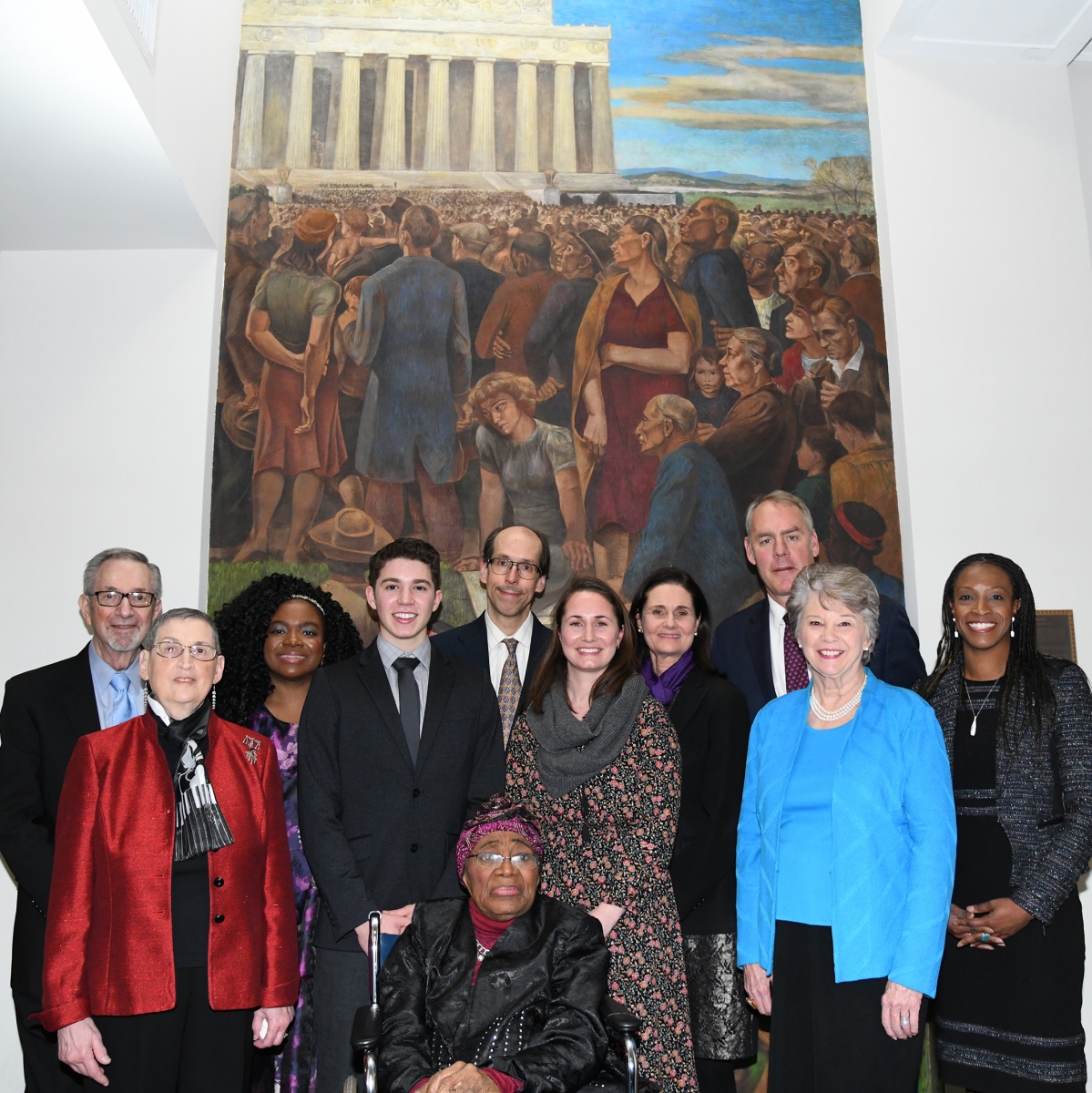News Release

DOI Photo / Tami Heilemann
News Release Date: February 1, 2018
Contact: NewsMedia@nps.gov
WASHINGTON – On the first day of Black History Month, U.S. Secretary of the Interior Ryan Zinke today celebrated the life and legacy of famed opera singer Marian Anderson by designating a mural depicting her 1939 Lincoln Memorial concert as a historic site under the African American Civil Rights Network Act of 2017. President Donald J. Trump signed the Act into law in January 2018. This is the first time the Act has been used to designate a site.
"The civil rights movement is one of the most moving chapters of the American story – the people and events that shaped this period of history continue to inspire Americans to this day," Secretary Zinke said. "Few events from this era stand out as more inspirational than the story of accomplished opera singerMarian Anderson holding a concert on the steps of the Lincoln Memorial after being barred from singing at Constitution Hall because of the color of her skin. As Secretary of the Interior, I am proud to call special attention to this aspect of our American heritage on the 75th anniversary of the dedication of a mural that captures the spirit of that groundbreaking event and serves as a cultural resource of national significance."
“I am glad to see Secretary Zinke and the Department of Interior utilizing the African American Civil Rights Network Act to honor such an important early moment in the Civil Rights movement,” South Carolina Senator Tim Scott said. “The mural of Marian Anderson’s concert at the Lincoln Memorial captures this historic event for generations to come, and this recognition is a fantastic way to celebrate Black History Month.”
“It’s wonderful that Marian Anderson, and the mural depicting her 1939 Lincoln Memorial concert, are receiving recognition as we celebrate Black History Month," said Utah Congresswoman Mia Love. "Ms. Anderson’s concert at the Lincoln Memorial is an important and significant event in black history. Long before the modern civil rights movement, her accomplishments served as an example of a woman refused to be defined by society. She had a wonderful voice, and she used it to empower others at a time when wasn’t always easy to do so.”
“The Marian Anderson Museum is humbly honored to participate in such a historic and sacred event honoring the legacy of our great Marian and Mitchell Jamieson’s timely and poignant piece," said Ms. Jillian Pirtle, President of the Marian Anderson Historical Society.
The Secretary signed the declaration at a ceremony co-hosted by the Marian Anderson Historical Society, high school activist Desmond Hertzfelder, family members of the mural's artist and members of the Anderson family. The event featured a musical homage to the late singer and civil rights leader by the National Marian Anderson Scholar artist program based in Philadelphia.
About Marian Anderson's historic performance:
In 1939, Constitution Hall was at the center of a Civil Rights crisis when the Daughters of the American Revolution (DAR), an all-white organization of descendants of Revolutionary War soldiers, denied the world famous singer Marian Anderson use of its concert hall for a performance.
At that time, Constitution Hall was the only local venue large enough to accommodate Anderson’s typical audience, but the venue banned black performers. The organization would not make an exception for Anderson and claimed the hall was already booked. The National Association for the Advancement of Colored People (NAACP) and Anderson’s manager arranged for her to sing instead on the steps of the Lincoln Memorial. Accompanied by a piano, Anderson first serenaded an integrated gathering of 75,000 people with the patriotic ballad, “My Country, ‘Tis of Thee.” Although Anderson and the DAR maintained the incident was merely a misunderstanding, the singer’s outdoor concert became a symbol for Civil Rights activism nation-wide. Anderson would go on to sing at Constitution Hall in front of an integrated audience in 1943.
About the African American Civil Rights Network Act of 2017:
This law requires the Department of the Interior to establish within the National Park Service (NPS) a U.S. Civil Rights Network that encompasses: (1) all NPS units and programs that relate to the African American civil rights movement from 1939 through 1968; (2) with the property owner's consent, other federal, state, local, and privately owned properties that relate or have a verifiable connection to such movement and that are included in, or eligible for, the National Register of Historic Places; and (3) other governmental and nongovernmental facilities and programs of an educational, research, or interpretive nature that are directly related to such movement.
Last updated: May 22, 2019
